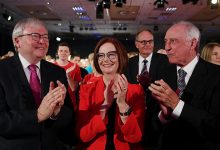Former Labor prime minister Julia Gillard has expressed optimism that Australia will eventually embrace strong climate policy while defending her government’s carbon price policy as one of the most effective measures introduced in Australia to cut emissions.
Speaking during a web forum organised by the Australia Institute, Gillard said that the evidence was clear that the carbon price introduced by her government successfully worked to cut Australia’s emissions without being a burden on the Australian economy.
Talk of Australia’s climate policy failures often focuses on Kevin Rudd’s CPRS, rejected by the Coalition after Tony Abbott emerged as their leader. Somehow, the Greens are blamed for this failure but it is often forgotten that the Greens worked with Labor to deliver the carbon price, along with ARENA and the CEFC.
Marking ten years since Gillard became prime minister, the former Labor leader was asked to reflect on the performance of the carbon price, which ultimately proved to be politically damaging, despite being effective policy.
“Australia’s emissions were going up; our carbon price came into effect, they went down. Then, it was repealed by the Abbott government and there they go, back up. So we would be in a different and better place on climate had that scheme endured,” Gillard said.
“One of the frustrations of sliding door moments is, other than in the famous movie, you don’t actually get to go back in time and run the parallel universe. We only live in one universe, in this reality.”
Labor was defeated the 2013 election following a concerted scare campaign run by the Abbott-led opposition around the perceived costs of the carbon price.
Despite promising that an Abbott government could deliver reductions in energy prices while continuing to cut emissions, history showed that the Abbott, and subsequent Coalition governments, have delivered the opposite on both fronts, with emissions and electricity prices surging.
In their analysis, The Australia Institute estimates that within three years of the carbon price’s repeal, wholesale electricity prices were as much as 14 per cent higher than when the carbon price was in place.
The Australia Institute’s assessment of the effectiveness of the carbon pricing mechanism also found that it has been the primary driver of Australia’s emissions reductions over the last decade.
The assessment finds that if the carbon price had stayed in place, Australia’s emissions would be 25 million tonnes lower in 2020, around 4 per cent below current their levels.
Gillard said that the success of the carbon price should provide some degree of optimism and that the issue of climate change, while politically difficult in Australia, was not an impossible problem for Australia to solve.
“It does worry me that sort of the received history is, ‘oh, climate. We’ve been fighting about that for forever. No one ever does anything. Nothing gets done. It probably can’t get done. It’s all too hard. It’s all too complicated,” Gillard said.
“I would like us to unpack that to the next level and say, no, it can get done. It was done. And if we did it once, then we can do it again in the future. ”
Gillard said that while carbon price could still play a key role and has been demonstrated to be an effective policy tool, it was important to acknowledge that somethings have to change and how Australia’s situation has changed.
“That doesn’t mean that it has to be exactly the same scheme, with all of exactly the same details. Things iterate, you know, it needs change over time. But we know how to do this. If we want to do it as a nation, we know how to do it,” Gillard said.
“We can be informed by past experience and we can get on with the job. So I do want to push back against that sort of received helplessness that it’s all too hard.”
Additional measures introduced by the Gillard government, including the Australian Renewable Energy Agency and the Clean Energy Finance Corporation, have also worked to cut Australia’s energy emissions.
Working alongside the Renewable Energy Target, which was increased to 20 per cent by 2020 under the first Rudd Government, the Australia Institute estimates the measures have contributed to 334 million tonnes of carbon emissions reductions.
“This research shows the Gillard Government’s carbon price was one of the most effective policy reforms in lowering Australia’s emissions. Not only was it a major mistake to repeal this legislation, no Federal Government has managed to implement a reform quite as successful since,” director of The Australia Institute’s climate and energy program Richie Merzian said.
“The Abbott Government’s repeal of the carbon price created years of unnecessary volatility in the electricity market and there is no doubt that wholesale electricity prices would be lower had the carbon price remained in place.”
“To make matters worse, following the carbon price repeal there has been a complete absence of a clear and credible climate and energy strategy, a situation that is still the case today,” Merzian added.












